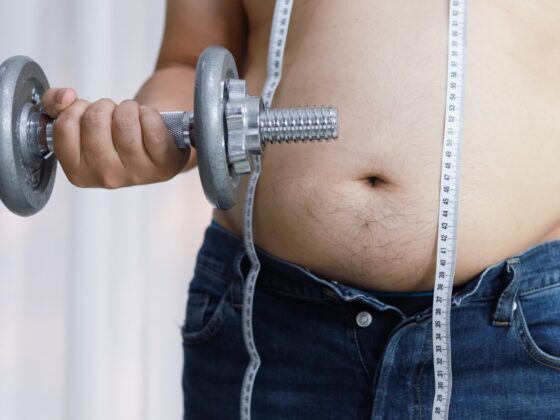Source – Alt: A couple sits in bed looking disappointed and upset after sex
For some guys, the idea of not cumming and being able to last for ages sounds like a damn superpower.
For others, it’s probably something that’s been driving you mad. Maybe you’re taking forever to cum, and sometimes not even being able to cum at all.
If you’re one of the latter, a guy who’s found yourself googling “Why can’t I cum” at 2AM while your partner’s asleep next to you, wondering what the hell is wrong with you, this is for you.
What’s wrong is that you’re experiencing a condition known as “delayed ejaculation,” a condition where a man has significant difficulty or inability to ejaculate despite adequate sexual stimulation and desire, as per its definition.
This affects between 1-4% of men, so a few million worldwide, and it can be incredibly frustrating, stressful, and not a lot of fun. It’s exhausting trying to reach the finish line with your partner feeling sore and thinking as though they’re not good enough.
Meanwhile, you’re in your head thinking you must be broken somehow.
It’s not a nice place to be, but here’s the deal: you’re not broken, you’re not less of a man, and this is a real medical condition with real solutions.
No embarrassing doctor visits where they tell you to “just relax” – we’re going to give you the actual facts and practical advice you need.
What is delayed ejaculation really?
Delayed ejaculation (DE) is defined as consistently taking over 25-30 minutes of stimulation to orgasm or not being able to ejaculate at all despite wanting to.
That said, the clock isn’t the problem.
If you’re distressed about how long it takes, it’s messing with your relationship, or it simply doesn’t feel right for you or your partner, that’s the real problem.
Doctors look for this happening in at least 75% of your sexual encounters for six months or more, but honestly? If it’s bothering you, it’s worth addressing regardless of how it fits some arbitrary medical criteria.
There are two main types of delayed ejaculation you should know about.
- Primary (lifelong) delayed ejaculation means you’ve always had this issue since you became sexually active
- Secondary (acquired) DE develops after a period of normal function – this is actually more common and often easier to treat.
Some guys experience it across the board, while others only struggle in certain situations (like with a partner but not when they’re flying solo).
The bottom line?
This isn’t some character flaw or lack of manliness. It’s a recognized medical condition that affects way more blokes than you’d think, and there are proven ways to deal with it.
The real causes of why you can’t cum
Source – Alt: A man and his partner look away from each other, the man looking shameful
There are actually plenty of reasons why you may be experiencing DE. Again, some causes are underlying, whereas others may just affect you during a specific time in your life, given certain circumstances.
Your medications might be cockblocking you
Let’s start with the biggest culprit – your medications.
Antidepressants, especially SSRIs, are the number one cause of delayed ejaculation.
We’re talking about 30-40% of guys on these meds experiencing some form of sexual side effect. Those pills that help with depression and anxiety increase serotonin, which can seriously delay your ejaculatory reflex.
Blood pressure medications, especially alpha-blockers like Flomax, are another common problem. Even some hair loss treatments can mess with your ability to finish. The good news?
This type of delayed ejaculation is often reversible once you work with your doctor to adjust or switch medications.
Medical conditions that mess with your mojo
Source – Alt: A man holding his hand open with two white medication pills in his palm
Diabetes is a major player here, affecting 35-50% of diabetic men’s ejaculatory function by damaging the nerves that control orgasm. Low testosterone, thyroid problems, and neurological conditions like MS or Parkinson’s can all interfere with your body’s ability to climax.
If you’ve had prostate surgery, pelvic trauma, or lower back injuries, nerve damage might be the issue.
Age brings its own challenges, too – after 40, you might notice it takes longer to finish, and that’s normal aging, not necessarily DE. But combine age-related testosterone decline with medications and health issues, and you’ve got a recipe for ejaculatory difficulties.
The mental game is stronger than you think.
Performance anxiety creates a vicious cycle – you worry about taking too long, which makes you take even longer. Depression affects your brain chemistry in ways that impact sexual function, even without medication.
Chronic stress floods your system with cortisol, basically putting your sexual response on the back burner.
Past experiences shape current function, too.
Maybe you learned to masturbate quickly and quietly as a teenager, or you’ve developed specific techniques that don’t translate to partnered sex.
Religious or cultural guilt about sexuality can create unconscious blocks. Some guys struggle with the vulnerability of “letting go” with another person.
The death grip dilemma
Here’s the elephant in the room that nobody wants to talk about: your masturbation habits.
If you’ve conditioned yourself to precise stimulation – what some call “death grip syndrome” – partnered sex might not provide enough intensity.
It’s not that porn or masturbation is evil, but if you can only finish with your exact technique while watching specific content, that’s definitely worth addressing.
Your hand can grip way tighter than any partner’s body, and if that’s what you’re used to, regular sex might feel insufficient.
Questions every bloke asks (but rarely out loud)
Source – Alt: A man sits in bed under his duvet, looking concerned, biting nails, holding his phone in his hand
“Why can I cum when I wank but not during sex?”
This is hands down the most common question, and it’s called situational delayed ejaculation.
You’ve likely developed what experts call “idiosyncratic masturbation patterns” – basically, your unique technique doesn’t match what happens during partnered sex.
Maybe you use a tight grip, specific speed, or a particular fantasy that can’t be replicated with a partner.
The solution isn’t to stop masturbating entirely but to retrain your response. Use lighter pressure, vary your technique, add lube to better simulate partnered sex, and practice being present in your body rather than being lost in fantasy.
Many guys see improvement within a few months of consistent practice.
“How long is too long anyway?”
Average ejaculation time is 5-10 minutes after penetration, but the range is huge – from 33 seconds to 44 minutes in studies. The medical threshold for DE is typically 25-30 minutes, but honestly?
Again, if you’re distressed about it, that’s what matters.
Your partner getting sore after 20 minutes isn’t sustainable, regardless of what the textbooks say.
“Is this going to ruin my relationship?”
It can strain things if not addressed.
Partners often blame themselves, thinking they’re not attractive or skilled enough. The key is communication – explain it’s a medical issue, not a reflection of your attraction to them.
Focus on pleasure and connection rather than orgasm as the goal. Many couples find this actually improves their sex life by taking performance pressure off.
“Could my meds be causing this?”
Absolutely. SSRIs are the biggest offenders, but blood pressure meds, hair loss treatments, opioid painkillers, and even some allergy medications can delay ejaculation.
Don’t stop taking prescribed medications without talking to your doctor, but definitely bring this up. Switching medications or adjusting doses can sometimes help without sacrificing the benefits you need.
What are some of the delayed ejaculation treatment options that actually work?
Source – Alt: A happy couple being intimate in the bedroom
Okay, enough theory, let’s actually address fixing the problem. There are a fortunate number of solutions to try.
Medical approaches
While there’s no magic pill specifically for delayed ejaculation, several off-label medications show promise.
Testosterone replacement helps if your levels are low. Some doctors prescribe medications like buspirone or bupropion that work on different brain chemicals than SSRIs.
For medication-induced DE, switching antidepressants or adding medications to counteract sexual side effects often helps.
Success rates vary wildly depending on the cause and treatment. The key is finding a doctor who takes this seriously and is willing to explore options.
Therapy that goes beyond “talking about your feelings.”
Sex therapy isn’t lying on a couch discussing your mother.
That could be part of it, but it’s really more practical, solution-focused work that might include masturbation retraining, sensate focus exercises (structured touching without performance goals), and communication strategies.
Couples therapy can be game-changing, with 50-70% success rates when both partners participate. A good sex therapist will give you homework – actual exercises to practice between sessions.
Yeah, it might feel awkward at first, but it works.
DIY strategies you can start tonight
Masturbation retraining is crucial if death grip is your issue. Take a break for at least a week, then when you resume, use a lighter touch with plenty of lube. Vary your technique – different positions, speeds, and pressures. Most importantly, slow down and focus on the journey, not the destination.
Kegel exercises aren’t just for women. Strengthening your pelvic floor can improve ejaculatory control. Contract the muscles you’d use to stop peeing mid-stream, hold for 3-10 seconds, then release.
Do 3 sets of 10-15 daily.
Other lifestyle tweaks can also make a real difference.
Regular cardio improves sexual function across the board. Limit alcohol – it might lower inhibitions, but it definitely impairs sexual response. Manage stress through whatever works for you – meditation, exercise, therapy, or whatever helps you chill out.
When to get professional help
See a doctor if you’ve been struggling for more than 3-6 months, it’s causing relationship problems, you’re trying to conceive, or if DE developed suddenly alongside other symptoms.
Start with your primary care doctor for initial evaluation and basic tests. They might refer you to a urologist for specialized care or a sex therapist for behavioral treatment.
Prepare for the appointment by listing all medications, noting when the problem started, and being ready to discuss your sexual and medical history. Yes, it’s awkward, but doctors deal with penises all day – yours isn’t special.
Be honest about masturbation habits, porn use, and relationship dynamics.
The more information they have, the better they can help.
Talking to your partner doesn’t have to be weird.
Choose a relaxed moment outside the bedroom. Start with something like, “I’ve been having some difficulty that I’d like to work on together.” Emphasize that it’s not about attraction – you desire them, your body just isn’t cooperating.
Most partners are relieved to know there’s an explanation and a path forward.
Busting myths that make things worse
- “Real men should last forever” – Complete bollocks. There’s a sweet spot for sexual duration, and it’s not a marathon. Most partners prefer 7-13 minutes of penetration. Beyond that, things can get uncomfortable or boring.
- “It’s the same as erectile dysfunction” – Nope. ED means trouble getting or keeping an erection. DE means everything works fine except the grand finale. Different problems, different solutions.
- “It’s all in your head” – While psychological factors matter, many cases have physical causes. Don’t let anyone dismiss your concerns without proper evaluation.
- “If you can masturbate, it’s not a real problem” – Situational DE is absolutely real and treatable. Your brain and body can develop different response patterns for solo versus partnered activity.
Wrapping up
Look, if you’re struggling with delayed ejaculation, here’s what you need to know: you’re not broken, and most guys see real improvement with the right approach. This isn’t about being less of a man – it’s about being smart enough to fix a fixable problem.
Whether it’s tweaking your meds, retraining your masturbation habits, or working through performance anxiety, there’s a solution out there with your name on it. Some guys need therapy, others need medical adjustments, and many find success mixing approaches.
The key?
Stop overthinking and start acting. Talk to your partner. Book that doctor’s appointment. Modify your solo habits. Your sexual health isn’t negotiable – it’s essential.
Great sex was never about lasting forever or performing like a porn star anyway. It’s about confidence, connection, and actually enjoying yourself.
When you sort out delayed ejaculation, you often end up with better sex overall because you’re communicating more and focusing on what actually feels good.
Speaking of confidence – if you want to maximize what you’re working with while you’re addressing DE, check out Bathmate penis pumps for safe, proven results that help you feel your absolute best.
Because every bloke deserves to feel confident about his package, no matter what challenges he’s working through.
Your future self is counting on you to take action. Don’t let him down.










